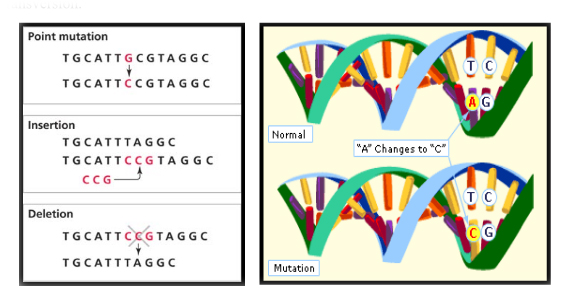Introduction:
Mutation is any sudden hereditary change in the genetic make up of an individual which can be caused by simple recombination of genes. Term Mutation was coined by “Hugo De Vries”.
Molecular Basis of Mutation:
Sometimes process of DNA replication show inaccuracy which may occur within the DNA due to some internal or external, natural or artificial factors. Slightest inaccuracy at any one of these levels introduce changes in the arrangement of nucleotides in DNA.
Types of Mutation:
POINT MUTATION: It is defined as the smallest change, change of a single base pair in DNA i.e, addition, deletion or substitution. Point mutation are of two types:
A) Substitution: In substititution mutation, a nitrogeneous base of a triplet codon of DNA is replaced by another nitrogeneous base. These can be of two types: (i) Transition: Tthe replacement of one purine by another purine and pyrimidine by pyrimidine. Such a mutation is called transition
(ii) Transversion: The replacement of Purine by Pyrimidine or Pyrimidine by Purine. Such a mutation is called Transversion.B) Frame-Shift: Mutation caused by addition or deletion of base pair in DNA, cause a shift in the reading frame of m-RNA, leading to a change in final Protein structure. Such Mutations are called Frame-Shift Mutations. These are of 2 types:
(i) Deletion: Mutation caused due to deletion or loss of one or more nucleotide.
(ii) Insertion: Mutation caused due to addition of one or more extra nucleotide in a DNA molecule.
Mutagens:
Physical, Chemical or Biological Factors causing mutations are called Mutagens.
(i) Physical Mutagens:
- Ionizing Radiations: X- rays and gamma- rays
- Non-Ionizing Radiations: UV-rays
(ii) Chemical Mutagens:
- Deaminating agents: Nitrous acid
- Alkylating Agents: EMS (Ethyl Methane Sulphonate), MMS (Methyl Methane Sulphonate)
- Deletion and Insertion Agents: Acridine dyes
Author:- Heena Kewalramani


